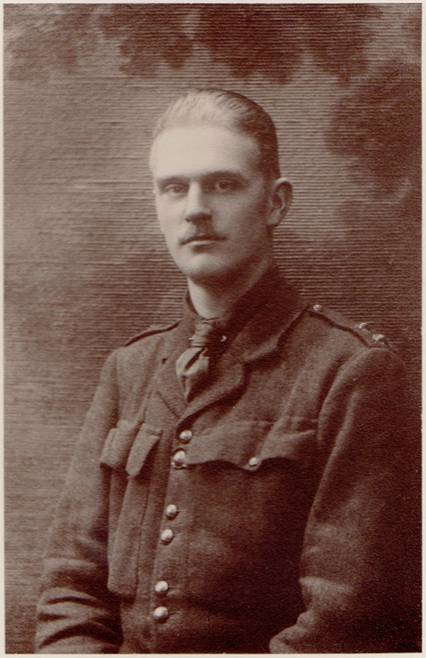On 8 September 1914 the B.E.F. moved towards the Marne and began to be attacked by von Kluck’s rearguard. In one such engagement a dear friend of the Calderons was hit by shrapnel. This was the 22-year-old Sir Roland James Corbet, serving with the 1st Battalion of the Coldstream Guards, which had been in France since 13 August.
‘Jim’, as he was known to all, was the surviving son of Sir Walter and Lady Caroline Corbet, and the latter (‘Nina’) was Kittie Calderon’s lifelong friend. His father had died in 1910. Nina had married Reginald Astley in 1913 and that summer George and Kittie attended the public festivities at Acton Reynald in Shropshire to celebrate Jim’s coming of age. Jim had a very strong sense of duty, but was kind, self-effacing, and a serious ornithologist. The present that Kittie and George gave him was two books by the naturalist W.H. Hudson.
As Jim described it in his diary:
We were ordered to advance and just as we had got through a little village called La Trétoire we were told to get into Artillery formation. Half my platoon under me, we went on down the road, and the other half went off to the right. I was just starting to double when BANG — a German shrapnel arrived and burst just right over us. It knocked down every single man in the half platoon, I believe. I went over with the rest and found myself on my hands and knees in the road not quite knowing whether I was killed or not. However, as I saw the others crawling away, I thought I had better do so too. So I crawled to the side and lay down beside a small apple tree some ten yards off the road. I felt pretty bad then and I remember clearly wondering whether I ought not to try and help some of the other men who had been hit and were lying in front of me. But somehow I seemed to have no energy in me. […] the Germans burst about three more shells in the same spot. […] As a man in my platoon lifted me up, I noticed the trunk of the apple tree I had been behind was quite studded with shrapnel bullets, so it was lucky I had been able to crawl behind it.
He had been hit in three places and it was thought a bullet had lodged in his stomach. Several men around him had been killed.
Next entry: 9 September 1914























